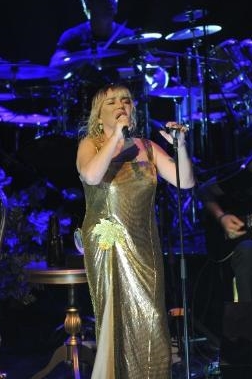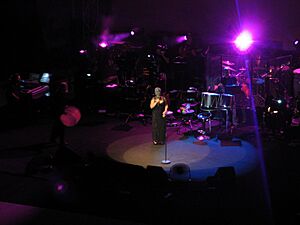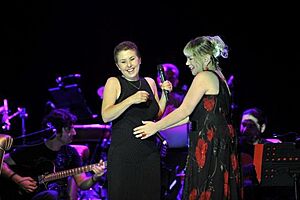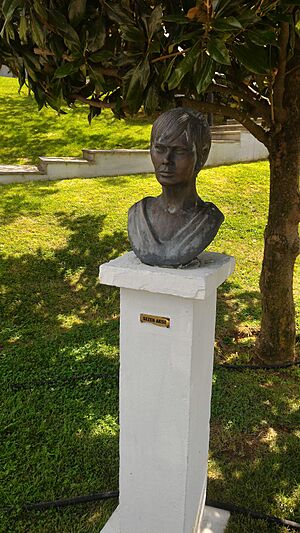Sezen Aksu facts for kids
Quick facts for kids
Sezen Aksu
|
|
|---|---|
 |
|
| Born |
Fatma Sezen Yıldırım
13 July 1954 Sarayköy, Denizli, Turkey
|
| Other names | Sezen Seley |
| Education | İzmir Girls High School Ege University (left) |
| Occupation |
|
| Spouse(s) |
Hasan Yüksektepe
(m. 1972; div. 1972)Ali Engin Aksu
(m. 1974; div. 1978)Sinan Özer
(m. 1981; div. 1983)Ahmet Utlu
(m. 1993; div. 1997) |
| Children | 1 (with Sinan Özer) |
| Musical career | |
| Genres | Pop |
| Years active | 1975–present |
| Labels |
|
| Signature | |
 |
|
Sezen Aksu (born Fatma Sezen Yıldırım on 13 July 1954) is a famous Turkish singer, songwriter, and music producer. She is one of the most successful Turkish singers, having sold over 40 million albums around the world. People often call her the "Queen of Turkish Pop" or "Minik Serçe" (which means "Little Sparrow").
Sezen Aksu has had a big impact on Turkish pop music and world music since she started in 1975. She has helped many other musicians, working with them and supporting their careers. Some of these artists include Sertab Erener and Tarkan. Her songs with Tarkan, like "Şımarık" and "Şıkıdım", became very popular across Europe. In 2010, a radio station called NPR named her one of the "50 Great Voices" in the world.
Contents
About Sezen Aksu
Sezen Aksu was born in Sarayköy, Denizli, Turkey. Her father was a math teacher. When she was three years old, her family moved to Bergama, where she grew up. Sezen's parents wanted her to become a doctor or engineer, so they didn't really want her to be a singer. She would often wait until they left the house to sing on the balcony. After high school, she started studying agriculture at college but later left to focus on her music career.
Along with her friend Ajda Pekkan, Sezen Aksu helped create Turkish pop music in the 1970s. Her music also became popular in the Balkans and Greece. She has performed concerts in Europe and the U.S., and critics have praised her shows.
Sezen Aksu cares a lot about important causes. She has supported changes to laws, rights for different groups of people, women's rights, protecting the environment, and improving education in Turkey. She has been married four times but kept the last name from her second marriage. She has a son named Mithat Can, who is also a singer in a band.
Her Music Journey
Early Career: 1975–1983
Sezen Aksu released her first song, Haydi Şansım/Gel Bana, in 1975. At first, she used the name "Sezen Seley." She became well-known in 1976 when her song Olmaz Olsun/Vurdumduymaz reached number one on the Turkish music charts. In 1976, she won an award for "Promising Female Artist of the Year." Her first album, Allahaısmarladık, came out in 1977.
Sezen Aksu wanted to represent Turkey in the Eurovision Song Contest in the 1970s. She tried three times in the national finals but didn't get to go. Later, one of her students, Sertab Erener, won Eurovision. This helped Sezen Aksu's dream of sharing Turkish music with more people in Europe come true.
The 1980s and 1990s
In the 1980s, Sezen Aksu worked closely with producer Onno Tunç. They created many new and exciting songs for Turkish pop music, like Sen Ağlama and Gülümse. Her album Gülümse became her best-selling album. A song from this album, Hadi Bakalım, was a hit in Turkey and Europe.
In 1995, Aksu released an album called Işık Doğudan Yükselir, which mixed Western classical music with traditional Turkish sounds. This album helped her become known outside of Turkey. In 1996, she released Düş Bahçeleri to honor Onno Tunç, who sadly passed away that year. In 1997, she worked with Goran Bregović on the album Düğün ve Cenaze.
She returned to her original style with Adı Bende Saklı in 1998. She kept trying new sounds and helped Turkish pop music grow. She released more albums like Deliveren and Şarkı Söylemek Lazım in the early 2000s. After a short break, she released Bahane in 2005. That same year, she released Kardelen, and all the money from it went to charity.
In 2005, Sezen Aksu was in a documentary film called Crossing the Bridge: The Sound of Istanbul. In 2006, she published a book called Eksik Şiir, which was a collection of her song lyrics. It was very popular. She released a second book of poems in 2016.
In 2008, Aksu released her album Deniz Yıldızı. In 2009, she released Yürüyorum Düş Bahçeleri'nde..., which included new songs and some older songs she had written for other singers.
In 2010, Sezen Aksu was named one of the "50 Great Sounds" by American radio station NPR. She also had successful concerts in Sweden and the USA in 2010. She performed in places like Carnegie Hall in New York.
In 2011, Aksu released the album Öptüm. It included songs she wrote and composed, and also a song by Nazan Öncel. A poem by Cemal Süreya was also turned into a song for the album.
In January 2016, Sezen Aksu announced that she would stop performing live concerts. She said she would continue to make music but would no longer perform on stage after a few promised shows. She later confirmed in September that she would keep making music.
In January 2022, a song by Sezen Aksu called "Ne Şahane Bir Şey Yaşamak" (which means "What a Wonderful Thing to Live") caused some discussion. The song was originally from a 2017 album. After a lyric video was put online in late 2021, some people criticized a line in the song. After a month, Sezen Aksu released a statement and shared the lyrics to a new song she wrote, saying, "You won't be able to crush my tongue."
Her Work for Good Causes
Sezen Aksu is known for caring about social issues. In 2009, she supported efforts to make Turkey more democratic. In 2012, she wrote a song called "Tanrının Gözyaşları" (Tears of God) to remember soldiers who had passed away.
She also spoke about the young people who protested in Gezi Park in 2013. She said they sent an amazing message. In 2014, she released a new song, "Yeni ve Yeni Kalanlar," to honor these young people.
Aksu works to fight against unfair treatment, like when people are treated badly because of who they are, or when they can't read. She also speaks out against bullying and discrimination. She is seen as a supporter of the LGBT community in Turkey. She has publicly helped and supported LGBT people through charity work. In 2008, she supported an LGBT group that was facing closure. In 2013, she performed with an actress and a large rainbow flag was shown, which was a big moment for a Turkish artist to show public support for LGBT rights on stage. She also wrote a statement supporting an organization that works for social policy, gender identity, and sexual orientation studies. She talked about fighting against violence and discrimination, saying she would stand up for those whose right to live freely was blocked.
An asteroid discovered in 2009 was named 266854 Sezenaksu, after her.
Her Life
Sezen Aksu married Hasan Yüksektepe when she was young, but they divorced soon after. She then married Ali Engin Aksu, and she kept his last name for her stage name. In 1981, she married Sinan Özer, and they had a son together. They divorced in 1983. Her marriage to journalist Ahmet Utlu in 1993 also ended in divorce.
Music Albums
Studio Albums
- 1977: Allahaısmarladık
- 1978: Serçe
- 1980: Sevgilerimle
- 1981: Ağlamak Güzeldir
- 1982: Firuze
- 1984: Sen Ağlama
- 1986: Git
- 1988: Sezen Aksu'88
- 1989: Sezen Aksu Söylüyor
- 1991: Gülümse
- 1993: Deli Kızın Türküsü
- 1995: Işık Doğudan Yükselir (Light Rises From the East)
- 1996: Düş Bahçeleri
- 1997: Düğün ve Cenaze
- 1998: Adı Bende Saklı
- 2000: Deliveren
- 2002: Şarkı Söylemek Lazım
- 2003: Yaz Bitmeden
- 2005: Bahane
- 2005: Kardelen
- 2008: Deniz Yıldızı
- 2009: Yürüyorum Düş Bahçeleri'nde...
- 2011: Öptüm
- 2017: Biraz Pop Biraz Sezen
- 2018: Demo
- 2022: Demo 2
- 2025: Paşa Gönül Şarkıları
Movies
- Minik Serçe (The Little Sparrow) – (1979)
- Büyük Yalnızlık (Great Solitude) – (1990)
- Crossing The Bridge: The Sound of Istanbul – (2005)
- The Ottoman Republic – (2008)
Musicals
- Sezen Aksu Aile Gazinosu (Sezen Aksu Family Music Hall) – (1982)
- Bin Yıl Önce Bin Yıl Sonra (1000 Years Before, 1000 Years Later) – (1986)
Books
- Eksik Şiir (The Missing Poem) (First issue: 2006 - Second issue: 2007)
- Eksik Şiir İkinci Kitap (The Missing Poem, Book Two) (2016)
See also
 In Spanish: Sezen Aksu para niños
In Spanish: Sezen Aksu para niños
- List of Turkish musicians
 | James Van Der Zee |
 | Alma Thomas |
 | Ellis Wilson |
 | Margaret Taylor-Burroughs |




